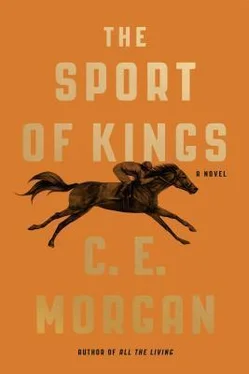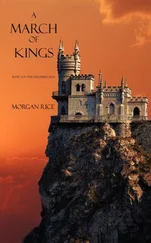1 ...7 8 9 11 12 13 ...153 Then Henry’s mouth was dry, his knees shaky from the heat, his hands the color of worked leather. The day was flaming when he toddled back onto the shaggy lawn, where his red wagon stood, and also his mother, now carrying a pitcher of sweet tea with their cook, Maryleen, following behind with a tray of glasses, stepping over him. The men were trickling in from the foddershocks like red-faced insects, and soon his mother retreated toward the house and beckoned with her hand. Filip was always there, always there in every memory.
Come , she signed. Come.
Filip went. Henry would not go, asked or unasked, remembering this, forgetting that; memory is a combine cutting and mixing everything. He ran toward the men, handing one of them his red ball. The man turned and long-armed it into the corn, and Henry went bounding after it, disappearing into the standing plants. When he returned on this day or another, they were eating their lunch and drinking tea and smoking hand-rolled burley. Filip sat at some distance beneath a maple, a wet blue bandana over his eyes. Henry settled behind them and made cigarettes of grass.
“Twenty-four today I bet,” one of the men said.
Another: “Think bigger, boys. I need the cash.”
“Shit, son, you just lucky anybody lets you cut nowadays. How much you wanna bet this here’s the last time? Nowadays … Look at this place, don’t tell me he can’t afford no picker. He ain’t even got no tobacco patch. Rich men can afford to do things sideways.”
“Him ain’t got no stock neither.”
A man said, “Y’all tell me this: You ever seen a man just grow corn and nothing else?”
“Onced or twiced.”
“But what does he do with the blades?”
No one answered.
“What does he do with the cobs?”
“They are some horses in that black barn.”
“And what about the nubbins?”
No one answered.
One whispered, “Well is he stupid or crazy…?”
“If you’re rich, you can afford to be both!” And there was uproarious laughter.
Henry was too young to feel a frisson of shame. Then the talk drifted; some of the men reclined on their backs and slept with their hats steepled atop their faces, so they wouldn’t burn. Henry curled around his red ball and slept too. And when he awoke, his mother was carrying him into the house, and the men were scattered in the fields again, and Filip was somewhere else.
By the evening, half the corn plants had been stripped and in their place stood scores of ricks, funereal heaps that would remain for weeks in the sun until the ears and the blades cockled and paled. Henry played among the short stalks when the men went home, the sharp, severed plants scraping at his ankles and shins. He leaned hard against the lee sides of the foddershocks, where no one in the house would see him. Sometimes his mother paid him a nickel to gather the gleanings for a neighbor woman, so he would stuff the raspy blades in a woven basket. He discovered worms and crawling beetles in the dirt and killed them. He tucked a blade in his mouth like an old man with a pipe. And when he slept at night, he dreamed he was climbing the ricks, but in his dreams there was never any top to them, they went forever upward like a magical beanstalk that he climbed under the watchful eyes of that age-old line of men looking down at him, watching him always.
Then the season ended, and the bright roulette of the year spun, and the next fall the men did not come. Only Filip and his teenaged nephew and a shiny new cornpicker with a wagon attachment. The store-bought contraption lumbered across the acres, swallowing ears off the stalks, leaving them upright and stripped in the field. Henry loved the brontosaurus neck of the picker, how quickly it spat ears from its mechanical mouth into the rolling wagon. He wagged and skipped along the line where the grass met the field, dueling the machine as it cobbed two rows in a single run, until one day his father returned unexpectedly at the lunch hour and snatched him from the field’s edge and thrashed him on the lawn and yelled at his mother. Later, when it was too painful to sit, Henry stood on his bedroom bay window seat, his hands frogged to the deadlight, watching the progress of the machine, wishing he could ride it like a metal horse. And he would have were it not for his father.
But this September, with the boy turned fourteen, the old picker was retired to its shed, and a new combine was driven through the streets of Paris. It came to devour the acres, threshing its way through their fields with a furious mouth and a fricative roar. Ruthless and fast, it snatched the stalks from the ground, mashing them. It would have handily outpaced the boy, but this year Henry didn’t even think about racing it. He was seven days out from the Osbournes’ farm and the spectacle of the broken filly. He stood pensive and alone with his back to the old cabins, where the picker was now abandoned, watching the combine as it routed the fields. The machine made quick, wasteless work of the corn and its speed was a marvel — he couldn’t deny that. But he also couldn’t care. Yes, he liked machines; in fact, he loved them. He was fascinated by the intestinal fittings of the tubes and fans beneath the hood of their sedan, how the bodies out of Detroit were yearly improved and refined. A short time ago he’d admired nothing better than the old picker he’d chased alongside. But he could see now that all these machines ran out of an obligation that was man-made; a thing without a will could run, but never race. Anyway, how much could you improve upon the combustion engine? It was — in some irreducible way — already the perfect fulfillment of its own potential, its invention and destiny the same damn thing.
Suspicion came to roost in his bones, and it tarnished everything. Here was the old dairy barn, its cribs retrofitted for the six Tennessee Walkers. Here were the slatted outdoor cribs, their sod floors still littered with last year’s kernels. There was the all-purpose barn, where the tractor idled; and there, the old equipment shed in which he had played as a child, that dank, battened place, sieved of sun, where he had found his first toys: corn knives in rows and hand-turned wood boxes with winches that no longer cranked, bladed objects that had not bored or shaved or whittled for so long that the blades were now thick with a hide of rust, an old plow stretching in the shadows that a boy could only pretend to drive, a boy born too late under the sign of advancement.
But Henry was ready to put away childish things. The bright, shiny apple of his youth now had brown spots. He knew that any beautiful thing not used rightly in its time would rot to its core. Bite the apple, build a better garden. He seized upon this certainty, and he took it to his father.
* * *
John Henry stood alone on the side porch, sipping his bourbon from a crystal tumbler, the faint warblings of his record player in one ear, the cleanup clatter of Maryleen’s kitchen in the other. Deep evening had draped itself across the burred fields and shrunk the day to downy mist. A full, unblinking moon rose up over the house as fresh night soaked into the grasses.
Slipping quietly, almost stealthily onto the porch, Henry cleared his throat. “Father, I wanted to talk to you. I’ve been thinking about the farm.”
John Henry didn’t turn. From the far side of the creek, he heard the whir of a baler working well past the supper hour, and occasionally, a snatch of swinging yellow lantern light shone through the Miller tree line, drawing his eye. It would be one of the Miller girls returning from milking.
“I’ve been thinking,” Henry said again, “that—” but he swerved suddenly from his course and said instead, “How long have we grown corn here?”
Читать дальше
Конец ознакомительного отрывка
Купить книгу












